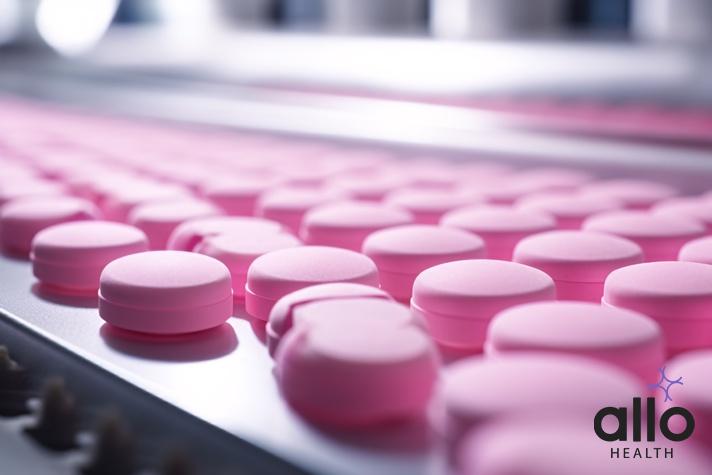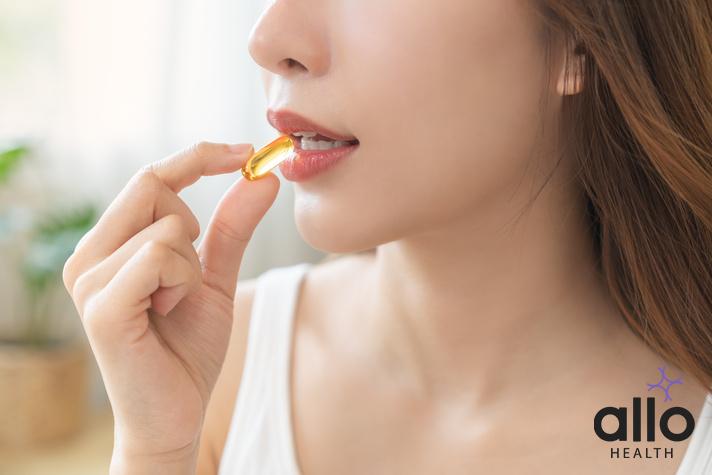When Will Your Periods Return After Stopping Regestrone?

Allo Health is dedicated to personalized well-being, offering support and trusted information tailored to individual health goals. The platform emphasizes human-generated content, led by a distinguished medical team of experts, including physicians and sexual health specialists. Their commitment to credibility involves rigorous fact-checking, authoritative research, and continuous updates to ensure accurate, up-to-date information. Allo Health's unique approach goes beyond conventional platforms, providing expert-led insights and a continuous commitment to excellence, with user feedback playing a crucial role in shaping the platform's authoritative voice.

Dr Sanina Mansoor holds MBBS degree from Yenepoya university,Mangalore.She has 8 years of experience working as a medical officer at various health centres and medical colleges.
Why This Was Upated?
Our experts continually monitor the health and wellness space, and we update our articles when new information became available.
Updated on 20 March, 2024
- Article was updated as part of our commitment to diversity, equity, and inclusion.

"The following blog article provides information about a drug or brand name drug and its potential effects or benefits. However, it is crucial to understand that this information is intended for general educational purposes only and should not be considered a substitute for professional medical consultation. It is highly recommended to consult with a qualified healthcare professional before making any decisions regarding medication, treatment, or healthcare management.
Book consultation
Individuals have unique medical conditions, and the information provided in this article may not be applicable to everyone. Only a qualified healthcare provider can evaluate your specific medical situation, taking into account your medical history, conducting appropriate tests, and providing personalized advice and recommendations. They are equipped to make informed decisions tailored to your individual needs.
It is crucial to emphasize that self-diagnosis, self-medication, or disregarding medical advice can have serious health consequences. This article may reference specific brand names or drugs for illustrative purposes. Mention of these names does not imply endorsement, recommendation, or guarantee of their efficacy or safety. The choice of medication should be based on discussions and individualized guidance from a healthcare professional who has a comprehensive understanding of your medical condition.
"Regestrone is a synthetic progestin hormone used to treat various gynecological and hormonal conditions in women. It is commonly prescribed to regulate menstrual cycles, control heavy vaginal bleeding, and manage conditions like endometriosis and polycystic ovary syndrome (PCOS). However, women who take Regestrone may wonder when they can expect their periods to return to their natural cycle after discontinuing the medication. In this article, we will explore the factors affecting the return of periods after stopping Regestrone.
Understanding Regestrone
Regestrone, known by its generic name Norethisterone, is a synthetic hormone medication. It is frequently prescribed in women’s healthcare to regulate menstrual cycles, control heavy menstrual bleeding, and manage various gynecological conditions. This medication works by modifying the hormonal balance in the body, particularly affecting the production and release of hormones like estrogen and progesterone. These hormonal changes brought about by Regestrone help in achieving its intended therapeutic effects, which include menstrual cycle regulation and the treatment of specific gynecological conditions.
How Does Regestrone Work for Periods
Regestrone tablets are a synthetic hormone medication that primarily works by affecting the hormonal balance in the female body. Here’s how it works:
- Hormonal Regulation: Regestrone is a synthetic progestin, a hormone that mimics the effects of the natural hormone progesterone. Progesterone plays a vital role in the menstrual cycle. Regestrone helps regulate the menstrual cycle by altering the hormonal balance, especially the levels of estrogen and progesterone.
- Delaying the Shedding of Uterine Lining: During a typical menstrual cycle, the uterine lining thickens in preparation for a potential pregnancy. If pregnancy doesn’t occur, this lining is shed, resulting in menstruation. Regestrone can delay this shedding by maintaining the uterine lining and preventing it from breaking down, which in turn delays the onset of menstruation.
- Treatment of Gynecological Conditions: Regestrone is often prescribed to manage gynecological conditions like heavy menstrual bleeding, irregular periods, endometriosis, and polycystic ovary syndrome (PCOS). In these conditions, the medication helps stabilize the uterine lining and hormonal fluctuations, reducing symptoms such as heavy bleeding and pain.
- Control of Menstrual Symptoms: Regestrone can also be used to alleviate symptoms associated with the menstrual cycle, such as painful periods (dysmenorrhea) and premenstrual syndrome (PMS). By modulating hormonal fluctuations, it can reduce pain, cramps, and emotional symptoms related to the menstrual cycle.
In summary, Regestrone works by influencing the hormonal balance in the body, particularly in the context of the menstrual cycle. It helps regulate and control menstrual cycles, manage gynecological conditions, and alleviate related symptoms by mimicking the effects of natural hormones like progesterone and estrogen. However, it’s important to use Regestrone only under the guidance of a healthcare professional, as its use and dosage should be tailored to individual needs and medical conditions.

Advantages Of Regestrone
Regestrone offers several benefits in women’s healthcare, primarily due to its ability to regulate and influence the menstrual cycle and hormonal balance. Some of the key benefits of Regestrone include:
- Menstrual Cycle Regulation: Regestrone is often prescribed to regulate irregular or unpredictable menstrual cycles. It helps establish a more consistent and predictable pattern of menstruation, making it easier for women to track and manage their periods.
- Management of Heavy Menstrual Bleeding: For women who experience excessive menstrual bleeding (menorrhagia), Regestrone can be a valuable treatment option. It helps reduce heavy bleeding by stabilizing the uterine lining and controlling the flow of blood during menstruation.
- Pain Relief during Menstruation: Regestrone is effective in alleviating menstrual pain and cramps (dysmenorrhea). By modulating hormonal fluctuations, it can reduce the severity of pain and discomfort associated with menstruation.
- Treatment of Gynecological Conditions: Regestrone is prescribed to manage conditions like endometriosis, polycystic ovary syndrome (PCOS), and uterine fibroids. It helps control symptoms related to these conditions, such as pelvic pain and irregular periods.
- Induction of Menstruation: In cases of amenorrhea (absence of menstruation), Regestrone can be used to induce menstruation. It helps initiate the shedding of the uterine lining, facilitating the onset of a menstrual cycle.
- Prevention of Abnormal Uterine Bleeding: Regestrone is employed to prevent abnormal uterine bleeding that can result from hormonal imbalances or certain medical conditions. It stabilizes the uterine lining, reducing the risk of uncontrolled bleeding.
- Treatment of Premenstrual Syndrome (PMS): While not always the first choice for PMS, Regestrone can help mitigate the symptoms of premenstrual syndrome, such as mood swings, bloating, breast tenderness, and headaches.
- Hormone Replacement Therapy: In some cases, Regestrone is used as part of hormone replacement therapy (HRT) during menopause to relieve symptoms like hot flashes, mood changes, and vaginal dryness.
It’s important to note that the use of Regestrone should always be under the guidance of a healthcare professional, as the dosage and duration of treatment can vary based on individual health conditions and treatment goals. While Regestrone offers these benefits, it may also have potential side effects, so its use should be carefully monitored by a qualified health provider.
Side Effects of Regestrone
Regestrone, like any medication, can have side effects. It’s important to note that not everyone will experience these side effects, and their severity can vary from person to person. Common side effects of Regestrone (Norethisterone) may include:
- Nausea: Some individuals may experience feelings of nausea while taking Regestrone. It is often recommended to take the medication with food to help mitigate this side effect.
- Headache: Headaches are a relatively common side effect associated with Regestrone use. Staying hydrated and managing stress can help reduce the frequency and severity of headaches.
- Breast Tenderness: Regestrone can cause breast tenderness or swelling in some individuals. This effect is usually temporary and resolves after discontinuing the medication.
- Changes in Menstrual Cycle: While Regestrone is often used to regulate menstrual cycles, it can initially cause irregular bleeding or spotting in some cases. This usually resolves as the treatment continues.
- Mood Changes: Some individuals may experience mood swings or changes in mood while taking Regestrone. It can affect mood stability in some users.
- Weight Changes: There have been reports of weight gain in some individuals using Regestrone, although this is not experienced by everyone.
- Fluid Retention: Regestrone can cause mild fluid retention or swelling in some individuals.
- Skin Issues: Rarely, it may lead to skin problems like acne or worsen existing skin conditions.
- Digestive Upset: Gastrointestinal issues, such as stomach discomfort, can occur in some cases.
- Allergic Reactions: While uncommon, some people may experience allergic reactions to Regestrone, which can manifest as hives, itching, swelling, or difficulty breathing. Seek immediate medical attention if this occurs.
- Serious Side Effects: In rare cases, Regestrone can lead to more severe side effects like blood clots, liver problems, or high blood pressure. If you experience symptoms like severe abdominal pain, chest pain, severe headaches, yellowing of the skin or eyes, or signs of a blood clot (e.g., swelling and pain in the legs), seek immediate medical assistance.
It’s essential to use Regestrone under the guidance of a healthcare provider who can monitor your response to the medication and adjust the treatment plan as needed. If you experience any severe or persistent side effects while taking Regestrone, it’s crucial to contact your healthcare provider promptly. Additionally, if you have a history of certain medical conditions or are taking other medications, discuss these with your healthcare provider before starting Regestrone to minimize potential interactions and risks.

Safety Advice for Using Regestrone
Regestrone, a medication commonly used to manage various gynecological and menstrual conditions, should be used with caution. Here are some safety guidelines to consider when using Regestrone:
- Consult a Healthcare Provider: Always consult with a healthcare provider before starting or stopping Regestrone. They will assess your specific health needs, prescribe the appropriate dosage, and monitor your response to the medication.
- Follow Prescribed Dosage: Adhere to the recommended dosage and treatment schedule provided by your healthcare provider. Do not alter the dosage or duration without their guidance.
- Understand Side Effects: Be aware of potential side effects associated with Regestrone, as mentioned in the medication information. Inform your healthcare provider if you experience severe or persistent side effects.
- Allergies and Sensitivities: If you have known allergies or sensitivities to any medications, including Regestrone, inform your healthcare provider. Allergic reactions can be serious, so make sure you are not allergic to any of the medication’s components.
- Blood Clot Risk: Regestrone can slightly increase the risk of blood clots, particularly in women with other risk factors like a history of blood clots or certain medical conditions. Discuss your risk factors with your healthcare provider.
- Regular Check-Ups: While using Regestrone, it’s advisable to have regular check-ups with your healthcare provider to monitor your response to the medication and any potential side effects.
- Pregnancy and Breastfeeding: If you become pregnant while taking Regestrone, inform your healthcare provider immediately. The medication is not suitable during pregnancy. Additionally, discuss the use of Regestrone while breastfeeding, as it can affect breast milk production.
- Medical Conditions: Inform your healthcare provider of any existing medical conditions, such as liver disease, high blood pressure, or a history of depression, as this can affect the safety and efficacy of Regestrone.
- Medication Interactions: Provide a list of all medications and supplements you are currently taking to your healthcare provider, as Regestrone can interact with other drugs. It’s essential to ensure that it does not negatively affect the action of other medications.
- Driving and Operating Machinery: Regestrone is generally not associated with drowsiness or impairment, but it’s important to observe how your body responds to the medication. If you experience dizziness or other side effects that could affect your ability to drive or operate machinery, exercise caution.
- Emergency Situations: In the event of an emergency, such as severe abdominal pain, chest pain, or signs of a blood clot, seek immediate medical attention. These symptoms should not be ignored.
- Storage: Store Regestrone as directed on the packaging, away from moisture and direct sunlight, and out of reach of children.
By following these safety guidelines and maintaining open communication with your healthcare provider, you can use Regestrone effectively and safely to manage your specific health needs and conditions. Always consult a medical professional for personalized advice regarding your use of Regestrone
Taking Regestrone to Induce Periods
Regestrone, also known as Norethisterone, is commonly prescribed to induce periods in women who experience irregular or absent menstrual cycles. If your healthcare provider has recommended using Regestrone for this purpose, here’s a step-by-step guide on how to take it:
Step 1: Consult Your Healthcare Provider
Before starting any medication, it’s crucial to consult with a healthcare provider. Discuss your specific situation, symptoms, and concerns related to your menstrual cycle. Your healthcare provider will determine if Regestrone is suitable for you and provide guidance on the correct dosage and duration of treatment.
Step 2: Obtain the Medication
Once your healthcare provider prescribes Regestrone, obtain the medication from a pharmacy or healthcare facility. Ensure you receive the correct dosage and quantity as prescribed by your healthcare provider.
Step 3: Understand the Dosage
Regestrone typically comes in tablet form with varying strengths, such as 5mg or 10mg. Your healthcare provider will specify the appropriate dosage for your condition. It’s essential to follow their instructions precisely.
Step 4: Timing and Schedule
Your healthcare provider will also provide guidance on when to start taking Regestrone. Usually, it involves taking the tablets for a specific number of days or within a particular timeframe of your menstrual cycle. Ensure you understand when to commence the medication.
Step 5: Take the Medication Regularly
Follow your healthcare provider’s instructions regarding the daily dosage and the frequency of taking Regestrone. Typically, it is taken once a day. Use a glass of water to swallow the tablet whole. You can take it with or without food, as directed.
Step 6: Finish the Course
Complete the entire course of Regestrone as prescribed by your healthcare provider. Do not stop taking the medication prematurely, even if your periods start before you finish the course.
Step 7: Monitor Your Body
While taking Regestrone, pay attention to any changes in your body or any side effects. If you experience any unexpected or severe side effects, consult your healthcare provider immediately.
Step 8: Be Patient
It might take a few days to a week after completing the course of Regestrone for your periods to start. Be patient and allow your body time to respond to the medication.
Step 9: Follow-Up with Your Healthcare Provider
After inducing your period with Regestrone, it’s advisable to follow up with your healthcare provider. They can assess your response to the treatment and discuss any further steps or considerations for your menstrual health.
Remember that Regestrone is a prescription medication, and it should be used under the guidance of a healthcare professional. Do not self-prescribe or alter the dosage without consulting qualified healthcare provider, as doing so can lead to potential health risks and complications.

After How Many Days of Stopping Regestrone Will Periods Return?
The time it takes for your periods to return to their natural cycle after stopping Regestrone can vary significantly from one person to another. Several factors influence the timeline, including:
- Dosage and Duration: The specific dosage and duration of Regestrone treatment will impact how long it takes for your periods to return. A shorter course of treatment with lower doses may result in a quicker return to regular menstrual cycles.
- Individual Hormonal Response: Every woman’s body responds differently to hormonal medications. Some may find that their periods return shortly after discontinuing Regestrone, while others may experience a delay.
- Underlying Health Conditions: If you were prescribed Regestrone to manage a specific health condition, such as PCOS or endometriosis, your underlying condition can affect the timeline for the return of your periods.
- Age: Age can play a role in how quickly your periods return. Younger women may find that their menstrual cycles return more rapidly, while older women may experience a longer delay.
- Lifestyle Factors: Your lifestyle and overall health can also influence when your periods return. Factors such as stress, diet, exercise, and body weight can impact hormonal balance.
- Concurrent Medications: If you are taking other medications alongside Regestrone, these medications may interact with each other and affect the timing of your menstrual cycle’s return.
Please remember: The return of menstrual periods after stopping Regestrone can vary from person to person. Typically, it may take anywhere from a few days to a couple of weeks, but it can sometimes be longer.
The timing depends on various factors, including the specific treatment regimen, individual hormonal responses, underlying health conditions, age, and other personal factors. It’s essential to consult with a healthcare provider for personalized guidance and to address any concerns about the resumption of menstrual cycles after discontinuing Regestrone.
Conclusion
The return of your periods after stopping Regestrone is a process that varies from person to person.
Factors like dosage, duration of treatment, underlying health conditions, age, and lifestyle all play a role in determining when your menstrual cycle will normalize. It is essential to consult with a healthcare professional to address any concerns or questions you may have about your menstrual health and the effects of Regestrone on your body. They can provide guidance and support to ensure your well-being throughout this process.
Frequently Asked Questions
- How long does it usually take for periods to return after stopping Regestrone?
The return of periods after discontinuing Regestrone can vary from person to person, but typically, it may take a few days to a couple of weeks. However, individual factors can influence the timing.
- What factors can affect the timing of period resumption after Regestrone?
Several factors play a role, including the specific dosage and duration of Regestrone treatment, individual hormonal responses, underlying health conditions, age, and lifestyle factors such as stress and diet.
- Is it normal for periods to be irregular initially after stopping Regestrone?
Yes, it is relatively common for periods to be irregular or accompanied by spotting in the initial stages after discontinuing Regestrone. The menstrual cycle may need some time to readjust.
- When should I consult a healthcare provider if my periods do not start after stopping Regestrone?
If your periods do not return within a reasonable time frame (several weeks), it’s advisable to consult a healthcare provider to rule out any underlying issues and discuss the next steps.
- Can I use Regestrone to induce periods if they don’t start after stopping the medication?
While Regestrone can be used to induce periods, it should only be done under the guidance of a healthcare provider. Self-prescribing this medication can have adverse effects, and it’s crucial to consult a professional for appropriate advice.






































